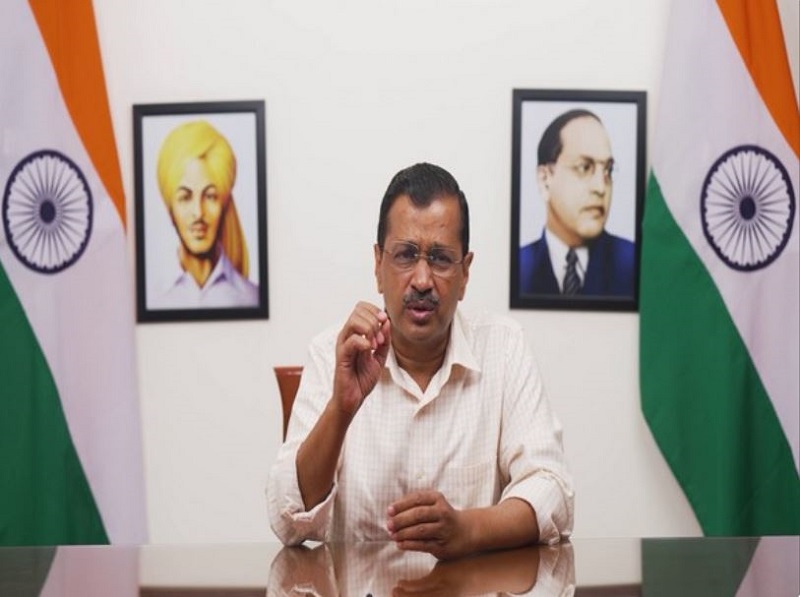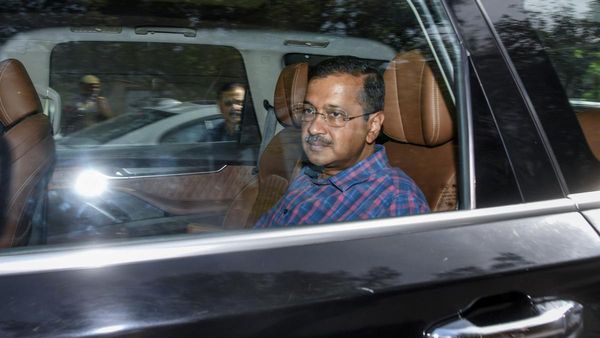
New Delhi: Delhi Chief Minister Arvind Kejriwal has moved the Sessions Court challenging summons issued to him by Additional Chief Metropolitan Magistrate on ED complaints for not complying with the summons issued by the central probe agency in the Delhi liquor policy money laundering case.
The Special Judge, Rakesh Syal, is scheduled to hear the matter this afternoon.
Last week, the Additional Chief Metropolitan Magistrate took cognizance of the Enforcement Directorate's second complaint and issued a fresh summons to Delhi Chief Minister Arvind Kejriwal for his personal appearance before the court on March 16, 2024.
ED recently moved the court with a second complaint for allegedly not complying with the summons in the alleged Delhi liquor policy money laundering case.
The Enforcement Directorate has moved that a second complaint has been filed against Arvind Kejriwal under Section 190 (1)(a) CrPC r/w section 200 CrPC 1973 r/w section 174 IPC, 1860 r/w section 63 (4) of PMLA, 2002 for non-attendance in compliance with Section 50, PMLA, 2002.
Earlier too, the ED filed a complaint against Arvind Kejriwal in which the court issued a summons to him in the matter.
Read This Also: Delhi CM Kejriwal agrees to appear before ED virtually, seeks date after March 12
Following the summons order, Delhi Chief Minister Arvind Kejriwal appeared virtually before the court on the ED's complaint against him for allegedly non-compliance with the summons order.
Arvind Kejriwal, while appearing, virtually informed the court that he wanted to join the court proceedings physically but due to the confidence motion and budget sessions, he couldn't come physically before the court.
Senior Advocate Ramesh Gupta appeared for Arvind Kejriwal, moved an exemption plea for Kejriwal and assured the court that on the next date, he would appear physically.
As noted in the submissions, Additional Chief Metropolitan Magistrate Divya Malhotra allowed the exemption plea moved for today and fixed March 16, 2024, for his physical appearance before the court.
On the first ED's complaint, Rouse Avenue Court on February 7, 2024, took cognizance of the Enforcement Directorate's recent complaint filed against Delhi Chief Minister Arvind Kejriwal for not complying with the summons issued by the central probe agency in the Delhi liquor policy money laundering case.
Recently, Delhi CM Arvind Kejriwal agreed to appear virtually before the ED on any date after March 12. On this decision, Delhi Minister Saurabh Bharadwaj stated that ED summons is 'illegal', but Arvind Kejriwal found a middle ground and decided to appear for questioning virtually so that CM Arvind Kejriwal could not be arrested illegally.
"While ED summons is absolutely illegal, the CM felt that BJP leaders and spokespersons are time and again accusing him of not answering the ED questions. We were always of the opinion that it was not about answering the questions, it was about the ED's intent to illegally arrest Arvind Kejriwal. So Arvind Kejriwal found a middle ground and decided to appear for questioning via video conferencing. But if there is some conspiracy and they want to arrest the CM at any cost, then the ED will force him to come," said Delhi Minister Saurabh Bharadwaj.
Read This Also: ED raids 13 places in UP, Maharashtra, Delhi in sand mining case against ex-UP Minister Gayatri Prajapati, his family
Meanwhile, Aam Aadmi Party leader Arvind Kejriwal has written a reply to the Directorate of Enforcement stating the ED's summons is "illegal." However, he has agreed to appear before the agency virtually on any date after March 12.
According to the ED, the agency wants to record Kejriwal's statement in the case on issues like the formulation of policy, meetings held before it was finalized, and allegations of bribery.
In its sixth charge sheet filed in the case on December 2, 2023, naming AAP leader Sanjay Singh and his aide Sarvesh Mishra, the ED has claimed that the AAP used kickbacks worth Rs 45 crore generated via the policy as part of its assembly elections campaign in Goa in 2022.
The excise policy was aimed at revitalizing the city's flagging liquor business and replacing a sales-volume-based regime with a licence fee for traders. It promised swankier stores and a better buying experience. The policy introduced discounts and offers on the purchase of liquor for the first time in Delhi.
Lieutenant Governor Vinai Kumar Saxena's move to order a probe into alleged irregularities in the regime prompted the scrapping of the policy. The AAP has accused Saxena's predecessor, Anil Baijal, of sabotaging the move with a few last-minute changes that resulted in lower-than-expected revenues.
Two senior AAP leaders, Manish Sisodia and Sanjay Singh, are already under judicial custody in the case.
Sisodia, who was the then Delhi Deputy Chief Minister, was arrested by the CBI on February 26 following several rounds of questioning. On October 5, the ED arrested Singh, who is a Rajya Sabha member. (ANI)










